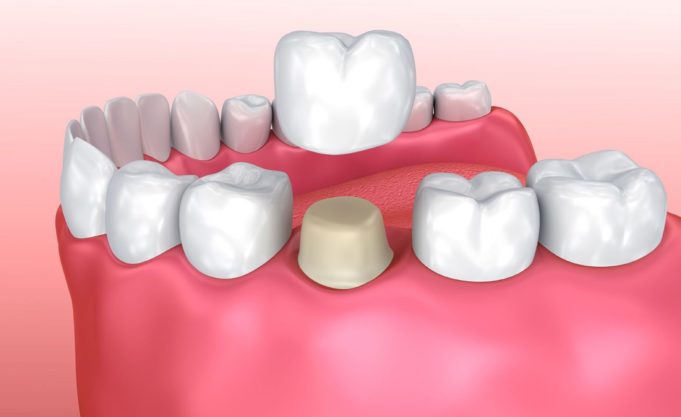The teeth are one of the strongest parts of our body. Nevertheless, they are not immune from the negative impact of the food we eat, the lifestyle we lead, and the environment. If we fail to preserve their original shape, color, and functionality, we have to find ways to correct the situation. Fortunately, today, prosthetics technologies are flourishing, and it is not a problem to restore damaged or destroyed teeth. Attractive crowns porcelain, for example, are in increasing demand.
Porcelain: Material Features
Porcelain was first used in prosthetics just over two centuries ago, and now, it is considered the most popular material. Crowns from it are essentially a ceramic product without metal impurities in the composition. The product is obtained by processing ceramic mass at high temperatures.
The complexity of the manufacturing process determines its high quality, resistance, precision fit, and aesthetics. Crowns made of this material are easy to install, hypoallergenic, and serve their owner for many years, retaining their original color and shape.
It is important to understand that porcelain and ceramics are, in fact, the same. Porcelain is a type of ceramics, one of its highest quality types, since it has a snow-white color even from the inside, as well as high strength characteristics.
However, in dentistry, there is no division into porcelain and ceramics as such, so crowns are generally called ceramic, even though there are varieties (pressed ceramics, ordinary, or even with the addition of a composite).
When Do We Use Them?
Porcelain designs will be an excellent choice in many problematic situations:
- Allergy to plastic or metal as porcelain crowns are completely compatible with oral tissues, and they are hypoallergenic.
- Perfect restoration of the smile zone: porcelain has an excellent light transmission and ideally repeats the natural shade of enamel, which allows you to make the prosthesis very aesthetic and hide its presence from others (it will not stand out against the background of neighboring teeth).
- The need to restore teeth severely damaged by caries or other dental diseases or those that have fluorosis, hypoplasia, or a wedge-shaped defect.
- The need to correct the shape and position of the tooth: crowns can be used only with slight curvature or deviation from the norm; otherwise, the patient may be recommended to wear braces.
Contraindications to the installation of these orthopedic products should also be taken into account. Among the limitations are serious bite anomalies, bruxism, and various inflammatory processes in the oral cavity in the acute stage. First, you need to eliminate the existing problems, and only then you can start prosthetics.
Types of Porcelain Crowns
Types of porcelain prostheses are determined by their location in the oral cavity – in front (frontal zone of a smile) or on the side. In addition, such prostheses can be made from various types of materials.
Classic ceramics
Such crowns are made of classical ceramics or porcelain with high esthetics and a rather good durability. They are placed mainly on the front teeth since it is here that the appearance is most important, while the chewing load is reduced to a minimum – that is, the risk of product breakage is reduced.
Pressed ceramic
In fact, it is lithium silicate, which is commonly called glass ceramics today. There are no pores in it, so the aesthetics of the finished product remain at the same high level, but at the same time, the strength characteristics increase significantly. This category includes brand materials, which are the most popular in the dental market today.
Advantages and Disadvantages of the Material
It is no coincidence that Europeans call special dental porcelain an enamel substitute. Prostheses from it not only perfectly repeat the anatomical features and shade of native teeth, but they are also smooth, translucent, and have a mirror shine, just like enamel. Porcelain teeth, if they are really made of high-quality materials, cannot be distinguished from real. Therefore, the material is often chosen for prosthetics of the front teeth — those that are located and clearly visible in the smile zone.
In addition, they are quite durable and resistant to chipping and perfectly retain their original shade even under the influence of a coloring pigment from food. With proper installation and high-quality oral care (regular hygiene, professional cleanings, refusal to combine hot food with cold food), porcelain products will delight you with their shine, stable shade, and shape for about 10-15 years.
If you have long dreamed of a flawless smile, porcelain crowns are a great way to achieve it. Installation is fast, and the designs are well suited for allergy sufferers who may react to polymers or metal. Products made of pressed ceramics are very light, and one gets used to them quickly.
However, this modern aesthetic material has its drawbacks. The material, due to its fragility, does not allow the manufacture of bridge structures. Only exclusively single restorations are performed with it. In addition, the production of porcelain prostheses is not cheap, which affects the final cost of the product, especially if the choice fell on modern pressed ceramics.
Care Instructions
For porcelain crowns to serve you for a long time, it is important to treat them with care. By observing the following precautions, you will extend their life:
- Thoroughly clean the oral cavity after each meal, use an irrigator and rinse.
- Do not use dental floss and brushes in the area of the installed crown because it can be damaged.
- Once every six months, carry out hygienic cleaning at the dentist. Of course, caries do not threaten an artificial tooth. However, the resulting plaque can get under the gingival margin and destroy the root system of a living tooth.
- Give preference to not very hard food and also avoid eating too hot or too cold food and drinks at the same time (such temperature changes can negatively affect not only the enamel of living teeth but also any artificial material).
- Give up bad habits, do not snack on restored teeth, do not open lids with their help, do not bite your nails, etc.
Altogether, porcelain crowns represent a good choice that can bring you a healthy flawless smile.












